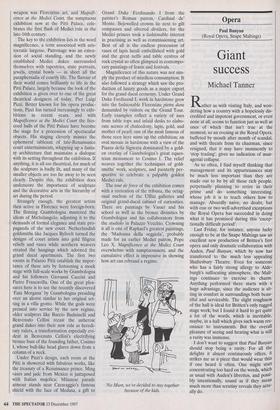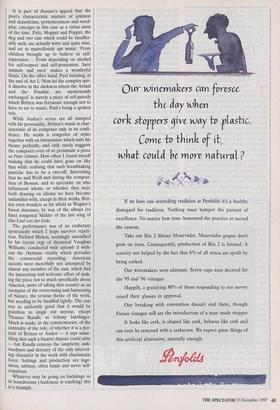Opera
Paul Bunyan (Royal Opera, Snape Maltings)
Giant success
Michael Tanner
Rather as with visiting Italy, and won- dering how a country with a hopelessly dis- credited and impotent government, or even none at all, seems to function just as well as ones of which that isn't true at the moment, so an evening at the Royal Opera, buffeted by month after month of scandal, and with threats from its chairman, since resigned, that it may have imminently to 'stop trading', gives no indication of man- agerial collapse.
As so often, I find myself thinking that management and its appurtenances may be much less important than they are made out to be by all those rich people, perpetually planning to retire in their prime and do something interesting, whose job it is to teach others how to manage. Absurdly naive, no doubt, but with one or two well-advertised exceptions the Royal Opera has succeeded in doing what it has promised during this 'excep- tionally difficult period'.
Last Friday, for instance, anyone lucky enough to be at the Snape Mailings saw an excellent new production of Britten's first opera and only dramatic collaboration with Auden, Paul Bunyan, which by now has transferred to the much less appealing Shaftesbury Theatre. Even for someone who has a fairly strong allergy to Alde- burgh's suffocating atmosphere, the Malt- ings continues to exercise its charm. Anything performed there starts with a huge advantage, since the audience is sit- ting in comfort in surroundings both beau- tiful and serviceable. The slight roughness of the hall is ideal for Britten's only rugged stage work; but I found it hard to get quite a lot of the words, which is inevitable, maybe, in a hall which gives such warm res- onance to instruments. But the overall pleasure of seeing and hearing what is still a rarity was immense.
I don't want to suggest that Paul Bunyan should stop being a rarity. For all the delights it almost continuously offers, it strikes me as a piece that would wear thin if one heard it often. One might start concentrating too hard on the words, which as usual with Auden's librettos, and possi- bly intentionally, sound as if they mean much more than scrutiny reveals they actu- ally do.
It is part of Bunyan's appeal that the poet's characteristic mixture of jokiness and didacticism, portentousness and word- play, emerges in this case as a virtue most of the time. Fido, Moppet and Poppet, the dog and two cats which could be insuffer- ably arch, are actually witty and quite wise, and set to marvellously apt music: 'From children brought up to believe in self- expression ... From depending on alcohol for self-respect and self-possession. Save animals and men' makes a wonderful finale. On the other hand, Paul intoning, at the end of Act I, 'Now let the complex spir- it dissolve in the darkness where the Actual and the Possible are mysteriously exchanged' is merely a piece of self-parody which Britten was fortunate enough not to have to set to music, Paul's being a spoken role.
While Auden's verses are all stamped with his personality, Britten's music is char- acteristic of its composer only in its confi- dence. He welds a congeries of styles together with an insouciance which suits his theme perfectly, and only rarely suggests the composer even of so proximate a piece as Peter Grimes. How often I found myself wishing that he could have gone on like that while realising that such breathtaking pastiche has to be a one-off. Interesting that he and Weill met during the composi- tion of Bunyan, and to speculate on who influenced whom, or whether they were both drawing on idioms we have become unfamiliar with, except in their works. Brit- ten even wonders as far afield as Wagner's forest murmurs, by way of the always (to him) congenial Mahler of the last song of Das Lied von der Erde.
The performance was of an exuberant spontaneity which I hope survives repeti- tion. Richard Hickox, seemingly unscathed by his recent orgy of theatrical Vaughan Williams, conducted with aplomb if with- out the rhythmic vitality which pervades the commercial recording. American accents were mercifully not attempted by almost any member of the cast, which had the interesting and welcome effect of mak- ing the piece not so much specifically about America, more of taking that country as an exemplar of the overcoming and harnessing of Nature, the serious theme of the work, but needing to be handled lightly. The cast was so uniformly good that it would be pointless to single out anyone, except Thomas Randle as Johnny Inkslinger. Much is made, in the commentaries, of the centrality of the role, of whether it is a por- trait of Britten or Auden — it says some- thing that such a bizarre dispute could arise — but Randle conveys the simplicity, awk- wardness and decency of the only interest- ing character in the work with charismatic force. Settings and production are inge- nious, unfussy, often funny and never self- conscious.
Whatever may be going on backstage or in boardrooms (Audenese is catching) this is a triumph.



















































































 Previous page
Previous page